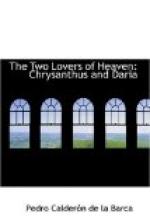This surely is unquestionably true, and the argument used by Sir F. H. Doyle to controvert it does not go for much. These Autos, no doubt, were, as he says, “composed in the first instance to gratify, and did gratify, the uneducated populace of Madrid”. Yes, the crowds that listened delighted and entranced to these wonderful compositions, were, for the most part, “uneducated” in the ordinary meaning of that word. But in the special education necessary for their thorough enjoyment, the case was very different. It is not too much to say that, as the result of Catholic training, teaching, intuition, and association, the least instructed of his Madrid audience more easily understood Calderon’s allusions, than the great majority of those who, reared up in totally different ideas, are able to do, even after much labour and sometimes with considerable sympathy. Mr. Tennyson says that he counts—
“The gray barbarian lower than the Christian child”,
because the almost intuitive perceptions of a Christian child as to the nature of God and the truths of Revelation, place it intellectually higher than even the mature intelligence of a savage. I mean no disrespect to Sir F. H. Doyle, but I think that Calderon would have found at Madrid in the middle of the seventeenth century, and would find there to-day, in a Catholic boy of fifteen, a more intelligent and a better instructed critic on these points, than even the learned professor himself. I shall make no further comments on Sir F. H. Doyle’s Lecture, but give his remarks on Calderon’s Autos to the end.
“At the same time”, says Sir F. H. Doyle, “Dr. Lorinzer’s knowledge of his subject is so profound, and his appreciation of his favourite author so keen, that for me, who am almost entirely unacquainted with this branch of literature, formally to oppose his views, would be an act of presumption, of which I am, as I trust, incapable. I may, however, perhaps be permitted to observe, that with regard to the few pieces of this kind which in an English dress I have read, whilst I think them not only most ingenious but also surprisingly beautiful, they do not strike me as incomprehensible at all. We must accept them, of course, as coming from the mind of a devout Catholic and Spanish gentleman, who belongs to the seventeenth century; but when once that is agreed upon, there are no difficulties greater than those which we might expect to find in any system of poetry so remote from our English habits of thought. There is, for instance, the Divine Philothea, in other words, our human spirit considered as the destined bride of Christ. This sacred drama, we may well call it the swan-song of Calderon’s extreme old age, is steeped throughout in a serene power and a mellow beauty of style, making it not unworthy to be ranked with that Oedipus Colonaeus which glorified the sun-set of his illustrious predecessor: but yet, Protestant as I am, I cannot discover that it




